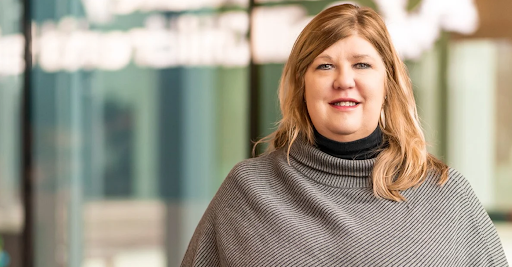

Nicole Reimer never expected to be a patient at the Lehigh Valley Topper Cancer Institute where she works as an oncology nurse. Caring for the terminally-ill has been a lifelong passion for the 55-year-old mother of three.
“From the moment I started working with cancer patients, I knew it was meant to be,” Reimer said. “After more than three decades, I thought I understood what my patients went through, but it wasn’t until my own care journey that I appreciated their experiences even more.”
Her journey as a patient started when she noticed a blue mole on her thigh late last year. Her dermatologist told her it was a blue nevus, a common skin growth that’s not usually cancerous. But the growth soon spread to other parts of her thing.
So, she arranged to meet with Dr. Aaron Blackham and Dr. Suresh Nair, a hematologist oncologist and Physician in Chief of Lehigh Valley Topper Cancer Institute.
“Hearing that I could be facing cancer was devastating,” Reimer remembers thinking at the time. “I was scared, but I knew that Drs. Blackham and Nair would do everything they could to get to the bottom of it, and they’d be there to support me every step of the way.”
They took a biopsy of the lymph nodes in her groin as well as the masses in her ovaries, which eventually led to not one but two shocking diagnoses.
“They did a scan of my pelvic region and found two large masses – one on each ovary,” she said. “I hadn’t experienced any symptoms, so I was in complete shock.”
Large masses can cause ovarian torsion, or a twisting of the ovaries.
“At that point, I was facing two potential cancer diagnoses, and I was beyond anxious,” Reimer says. “But I knew if anyone could get me through it, it would be my care team.”
The large ovarian masses turned out to be benign, but they needed to be removed as soon as possible. Thomas told her that she needed a hysterectomy and that the procedure would be performed robotically.
“The robotic approach to gynecologic surgery offers a lot of benefits. Many patients return home on the same day and experience less pain during their recovery than they would after an open procedure. There is also a much shorter recovery time, with many patients returning to their regular activity level in two to three weeks,” Thomas explained.
“At some facilities, Nicole’s only option would have been an open surgery, which would have required hospitalization afterward and close to six weeks of recovery. After reviewing Nicole’s scans, I was confident that with my team’s experience, we could take a robotic-assisted laparoscopic approach to her procedure.”
Reimer said she was a nervous wreck the day of the surgery, but Thomas did his best to ease her concerns.
“[He] came to see me beforehand, and he told me that I had been on the top of his prayer list that morning,” Reimer added. “He was not only knowledgeable and reassuring, but also so empathetic and kind.”
She returned home the same day as the procedure and was able to drive five hours the following weekend to see her son’s football game.
After a couple weeks of anxious waiting, Reimer finally received the news she was hoping for: none of the masses on her body were cancerous.
“I cannot begin to describe how amazing my care team was, both in caring for me clinically and supporting me emotionally,” Reimer says. “I couldn’t have asked for a better experience, and I cannot recommend the Cancer Institute enough for anyone facing something similar.”
In a shocking incident on December 4, 2024, Brian Thompson, the CEO of UnitedHealthcare, was…
In an unprecedented step toward financial relief and health equity, the city of St. Paul,…
In early November 2024, a shocking tragedy unfolded in Budapest, Hungary, as American nurse Mackenzie…
If Robert F. Kennedy Jr. were to assume leadership of the U.S. Food and Drug…
On November 1, 2024, federal authorities charged 38-year-old Rebecca Fadanelli, owner of Skin Beaute Med…
In a quaint little restaurant in Echo Park, an up and coming author is sitting…